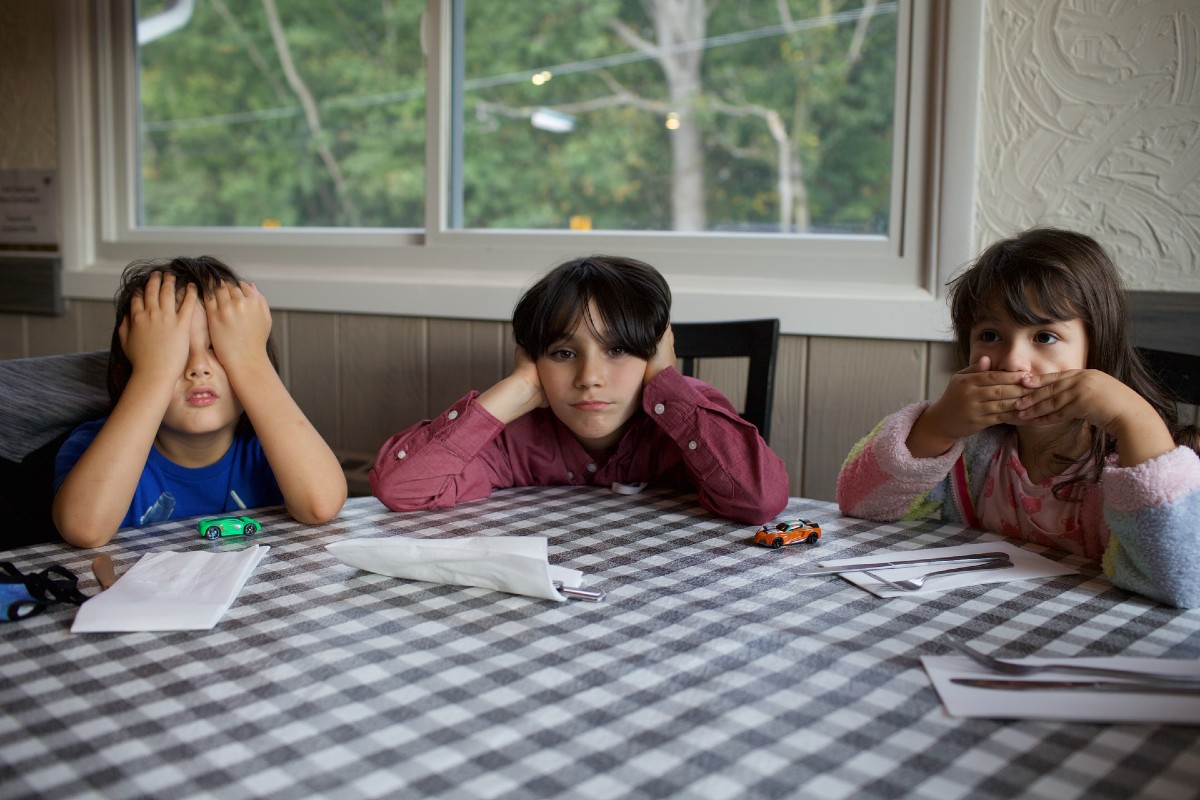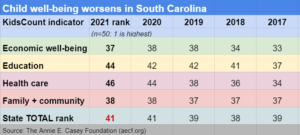
By Andy Brack, editor and publisher | The environment in which South Carolina’s children grow up has gotten slightly worse over the last five years, according to a review of annual studies that rank child well-being in states across the nation.
South Carolina ranks 41st out of 50 states in child and family well-being, according to the 2021 KidsCount national survey. Five years ago, the state ranked 39th.
The annual survey of data, which is compiled by the Annie E. Casey Foundation and reported in the Palmetto State by the Children’s Trust of South Carolina, combines four data points each for economic well-being, education, health care, and family and community to develop the overall ranking.

When asked about the danger of state and local lawmakers doing nothing to move South Carolina’s children away from the nation’s bottom tier of results, Children’s Trust Director of Research Aditi Srivastaf Bussells said, “When we don’t set up our future generation for success, the success of South Carolina is at stake. When our children can’t flourish, how can we expect our economy or our communities to?”
Steve Skardon, executive director of the Palmetto Project, highlighted the business impact of doing nothing: “When we have an unhealthy South Carolina, we have an unhealthy workforce.”
Indicator: Economic well-being
 Economic well-being dropped from a middle-tier score of 33 out of 50 states in 2017 to a rank of 37 in 2021. While the overall score went down, the state improved its metrics on each of the indicators that made up the category. That suggests while South Carolina is doing better than it was earlier on improving economic well-being for children, other states are doing even better.
Economic well-being dropped from a middle-tier score of 33 out of 50 states in 2017 to a rank of 37 in 2021. While the overall score went down, the state improved its metrics on each of the indicators that made up the category. That suggests while South Carolina is doing better than it was earlier on improving economic well-being for children, other states are doing even better.
- Children in poverty: In 2021, the state had about 215,000 children living in poverty, compared to 256,000 in 2017.
- Children whose parents lack secure employment: In the 2021 report, an estimated 28 percent of children were in this category, compared to 31 percent five years earlier. The number dropped from 332,000 to 311,000 children.
- Children living in households with a high housing-cost burden: The percentage dropped from 29 percent of children in 2017 (332,000 children) to 26 percent of children (284,000 children) in the 2021 report.
- Teens not in school and not working: Dropped from 21,000 to 19,000 over five years.
Indicator: Education
South Carolina ranked 44th on the KidsCount education category, down from 37th in 2017. There were about 3,000 fewer children ages 3 and 4 not in school (65,000 in 2021 versus 68,000 in 2017). Compared to 2017, indicators showed about the same number of fourth graders (68 percent) were not proficient in reading, the same percentage of eighth graders (71 percent) were not proficient in math, and the same percentage (20 percent) of high schoolers were not graduating on time. Again, the numbers were similar overall, but the state didn’t make enough improvements over the five years to keep from dropping in its education rank.
Indicator: Health
The state’s rank in this category dropped from 39th in 2017 to 41st in 2021.
- Low birthweight babies: The number went up from 5,535 in 2017 to 5,610 in 2021.
- Children without health insurance: South Carolina had 44,000 children without health insurance in 2017, compared to 69,000 in 2021, the report said.
- Child and teen deaths per 100,000: This number also went up — from 373 in 2017 to 391 in 2021.
- Obesity: This category was added between 2017 and 2021, but the new report said child obesity was worse, impacting 36 percent of kids from 10 to 17.
Indicator: Family and community
The state’s KidsCount rank in this category dropped one place to 38th out of 50 states. But individual categories of data showed improvement. Of particular interest was a large dip in children living in high-poverty areas, which dropped from 153,000 in the 2017 report to 101,000 in 2021. Also of note was a major drop in teen births from 4,021 in 2017 to 3,425 in the 2021 report.
Next steps
Experts say more investment in education, health care and other areas is needed for South Carolina’s well-being scores to improve. The same advice comes year after year.

After the pandemic, which the Children’s Trust CEO Sue Williams said caused big setbacks for children, it’s more important than ever to invest.
“We want our state to be a place where all children can thrive, families have what they need to provide stable and loving homes for their children, and communities have resources to wrap around families in times of crisis and hardship,” Williams said in a statement.
Bussells added, “Local and state decision makers need to consider passing policies that provide well-paying jobs for hardworking families, recruit and retain a highly skilled education workforce, provide access to broadband for all, and expand access to affordable health insurance for all families.”
She said county officials could get into the game of doing more to help children, too.
“On a county level, work to make communities safe and free from violence, provide options for affordable housing, fund schools equitably (not the same as equally), provide community-based resources that help young parents with their skills and abilities to enter the workforce and balance the needs of their family.”
- Read the 2021 KidsCount report here.
- Have a comment? Send to feedback@statehousereport.com
















 We Can Do Better, South Carolina!
We Can Do Better, South Carolina!